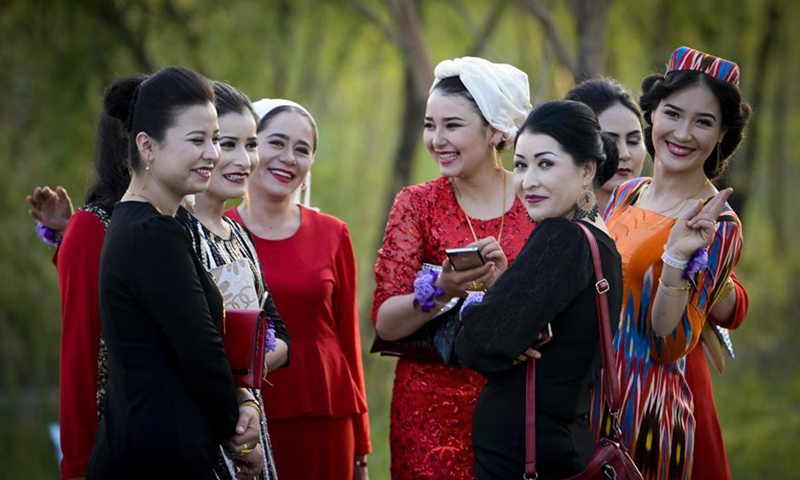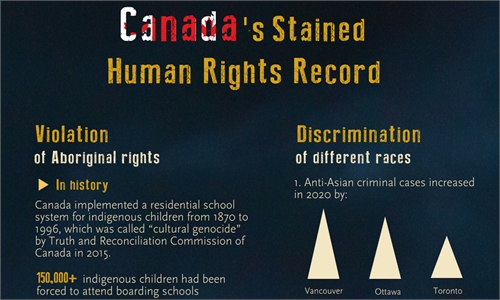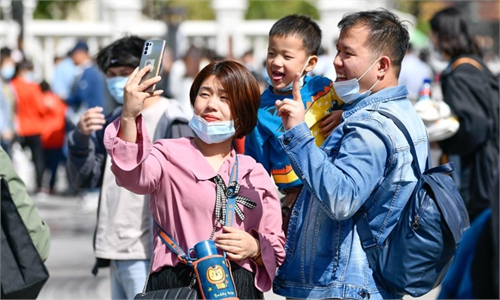CPC-led Chinese human rights development 'practicable for most developing countries'

Residents participate in a wedding ceremony at a scenic spot by Ili River in Yining of northwest China's Xinjiang Uygur Autonomous Region, May 5, 2017.Photo:Xinhua
A Thursday white paper on the practice of the Communist Party of China (CPC) in respecting and protecting human rights highlighted how the Party has always put people first, applying the principle of universality of human rights in the context of the national conditions in its 100 years of leading revolutions and peaceful development.
The concept best applies to Chinese society and is different from the Western human rights view, experts said, warning against the West's typical action of using human rights as a tool to crack down on others politically or economically.
The white paper was released by China's State Council Information Office on Thursday.
The white paper's seven chapters summarized how the Chinese concept of human rights has developed in the fight against the "three mountains" of imperialism, feudalism and bureaucrat-capitalism, and in the socialist construction and reform and opening-up.
In the process, the CPC ensured economic, social, cultural and environmental rights, put in place the world's largest social security system, and coordinated the protection of civil and political rights.
Increasing life expectancy from about 35 in 1949 to 77 in 2019, expanding GDP per capita by roughly 600 times since the founding of the People's Republic of China, lifting 100 million people out of poverty in the past eight years… are among the achievements based on China's prioritizing human rights to subsistence and development.
Meanwhile, China has been an active participant in matters of international human rights, engaging in international human rights undertakings such as UN peacekeeping operations and working with other countries to forge a global community of shared future, said the white paper.
The white paper elaborated on how China's understanding of human rights ripened based on its independence and prosperity path, which showed contrast to the Western human rights narrative that developed later than economic growth and focused on political rights, analysts said.
Qian Jinyu, director of the Human Rights Research Center of Northwest University of Political Science and Law, told the Global Times that the white paper was released ahead of the 100th anniversary of the CPC to review its achievement on leading Chinese people to a better life as well as to show the Party's resolve to push forward China's human rights to a new level in the future.
"Practices are the sole criteria for testing truth. China's achievement on human rights, especially since the reform and opening-up, has been witnessed by the international community, which proves the validity and rationality of the human rights patterns with Chinese characteristics," said Qian, noting that China's experience is also practicable for most developing countries.
The Western concept on human rights does not fit all societies but some Western countries have been using their hegemony in human rights narrative to argue that their concept should be accepted universally.
He Zhipeng, a professor of international human rights and legal education at Jilin University, noted that such Western narrative has a vicious aim of denying other countries' development rights and interfering in their internal affairs.
He cited the examples of US-led attacks on China's human rights situation and smears against Xinjiang cotton at a press conference related to the white paper on Thursday.
Qian noted that the West and the US keep hyping Xinjiang-related topics at the UN Human Rights Council and their purpose is not to care about the human rights situation in China's Xinjiang. "Actually, they are unable to better solve human rights problems of their own and still want to lecture others. They only use human rights topics trying to keep dominance on the international discourse and to contain other countries."
At the 47th session of the UN Human Rights Council, Canada led a group of Western countries to release a joint statement to make groundless accusations of China on Xinjiang Uygur Autonomous Region, Hong Kong Special Administrative Region and Tibet Autonomous Region in the excuse of human rights.
More than 90 countries expressed their support to and understanding of China's stance and 65 of them clearly opposed Western interference with China's domestic affairs.

The practice of the CPC in respecting and protecting human rights Graphic: Chen Xia, Feng Qingyin/GT




